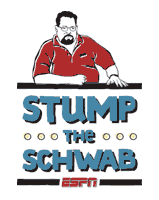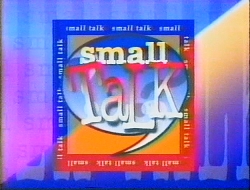
Reach for the Top is a Canadian trivia based academic quiz competition for high school students. In the past, it has also been a game show nationally broadcast on the CBC. Matches are currently aired online through Reach for the Top's official YouTube channel. Teams qualify for national rounds through several stages of non-televised tournaments held at high schools throughout Canada during the year which are known as Schoolreach.

Chain Reaction is an American television game show created by Bob Stewart, in which players compete to form chains composed of two-word phrases.
Catch Phrase is a word guessing party game commercially available from Hasbro.

Stump the Schwab is an American game show that aired on ESPN2 and ESPN Classic from July 8, 2004 to September 29, 2006. The show featured three contestants trying to defeat Howie Schwab, ESPN's first statistician, in a sports trivia contest. Stuart Scott was the show's host. The show also appeared on Canada's The Score Television Network.
Time Machine is an American game show where contestants compete to answer trivia questions about popular culture and recent history to win prizes. The show aired on NBC from January 7 through April 26, 1985, and was hosted by John Davidson. Charlie Tuna was the announcer, with Rich Jeffries as his substitute. Reg Grundy Productions produced the series, and upon its premiere Time Machine was one of three Grundy series airing on NBC.
Battle of the Brains is a quizbowl show in the Richmond and Hampton Roads areas of Virginia. The show is Central Virginia's longest running highschool quiz TV Show. It currently airs on WTVR in the Richmond area, and WTKR in Hampton Roads. The current show began in Richmond in 1975, and it originally aired on a local PBS member station until it was canceled by the station. Its 2002–2003 season was aired on a public-access television cable TV station, before the Richmond CBS affiliate added the show, where it currently airs on Saturday mornings at 10:00 A.M. The Hampton Roads program began with the 2004-2005 season, formerly airing on WAVY-TV. In the 2017-18 season, it airs on WTKR at 11:00 A.M. As of August 2024, it has changed the timeslot to Saturday mornings at 10:00 A.M.

Small Talk is an American game show hosted by comedian Wil Shriner and produced by Reg Grundy Productions that aired on The Family Channel from September 30, 1996, to January 3, 1997. Reruns continued until January 17. The series aired as part of an original game show block, alongside The New Shop 'Til You Drop, Shopping Spree, Wait 'til You Have Kids, and The New Family Challenge. Small Talk along with Kids and Family Challenge would all be cancelled by the end of 1997. This left The New Shop til You Drop and Shopping Spree as the only two game shows left on the block and the only ones to last more than a single season.
Sports Challenge is a sports-centered game show that aired in weekly syndication from 1971 to 1979, with a separate version that aired briefly on CBS weekends from May 20 to September 9, 1973. Dick Enberg was host. Johnny Gilbert, Art James, and John Harlan announced.
The Last Word is a game show seen in syndication in the United States and on the Global Television Network in Canada that was produced by Merrill Heatter Productions and ran for 65 episodes from September 18 to December 15, 1989, with reruns continuing until January 5, 1990. The host was Wink Martindale, and the co-host/announcer was Jennifer Lyall. It was taped in Vancouver, British Columbia. In the Los Angeles-produced pilot, Burton Richardson was the announcer, and Jana White operated the computer and acted as co-host. The show was distributed by Turner Program Services.
Animal Planet Zooventure is an American children's television game show which originally broadcast on Animal Planet and Discovery Channel from March 31, 1997 to 2000. The show was taped at the San Diego Zoo, and was hosted by J. D. Roth. In the show, four child contestants competed in a series of animal-themed stunts for the grand prize, which is to be a zookeeper for a day.
Codex is a game show that aired on Channel 4 from 12 November 2006 to 15 December 2007 and was hosted by Tony Robinson.

Supermarket Sweep is a British game show that is based on the original American version. Originally hosted by Dale Winton, it ran for exactly 8 years from 6 September 1993 to 6 September 2001 and then revived from 12 February to 31 August 2007 on ITV.

Break the Bank is a game show created by Richard S. Kline. It aired in syndication from September 16, 1985 to June 20, 1986, with repeats airing until September 12. It was not related to two previous shows by the same name.
Family Feud is an Australian game show based on the American show of the same name. The program ran on the Nine Network from 1978 to 1984, and on the Seven Network from 1990 to 1996. The program has been revived twice, in 2006 and 2014.
Family Game Night is an American television game show based on Hasbro's family of board games and EA's video game franchise of the same name. The show was hosted by Todd Newton. Burton Richardson was the announcer for the first two seasons; he was replaced by Stacey J. Aswad in the third season, and Andrew Kishino was hired for the fourth season. The 60-minute program debuted on October 10, 2010, on The Hub ; it was previewed on October 9, 2010, on its sister channel, TLC. Seasons 1 and 2 contained 26 and 30 episodes respectively. Seasons 3, 4 and 5 each contained 15 episodes. Season 2 premiered on Friday, September 2, 2011, with additional games being added. The games added to the second season included Cranium Brain Breaks, Green Scream, Ratuki Go-Round, Simon Flash, Operation Sam Dunk, Trouble Pop Quiz, and Spelling Bee. However games from the previous season were still kept.
The Main Event was a weekly hour-long Australian game show that aired on the Seven Network from 1991 to 1992. The show was hosted by Larry Emdur, with Don Blake and Niel Chantler as announcers.
Sex Wars was an American television game show that pitted two teams, one consisting of men and one consisting of women, against each other; hence, the show's name was derived from that.
Move It is an Australian children's game show series that aired on 9Go! on weekdays at 8:00 am. Episodes were repeated on Saturdays at 12:00 pm.

America Says is an American television game show hosted by John Michael Higgins and broadcast on Game Show Network. The series consists of two teams of four guessing the top answers to fill-in-the-blank survey questions. It is a restructuring of the Audience Match portion of Match Game.

Common Knowledge is an American television game show hosted by Joey Fatone that aired on Game Show Network from January 14, 2019 to August 13, 2021. On April 17, 2019, media reports stated that GSN had renewed the show for a 130-episode second season. On March 25, 2021, GSN renewed the show for a third season, which premiered on May 17, 2021.







